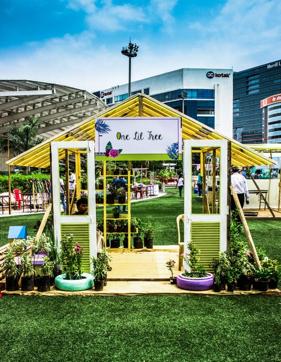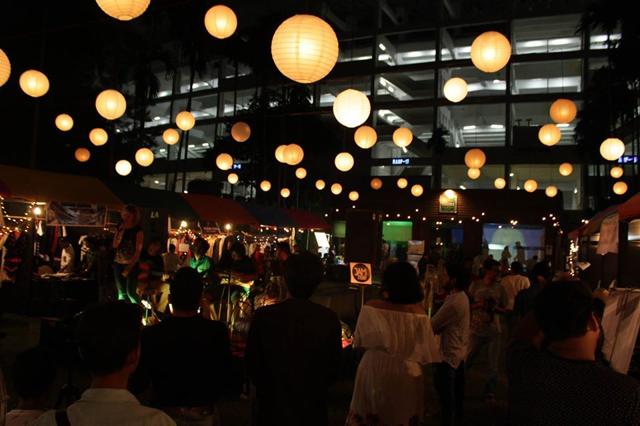Wine tastings, live music, unique designs: The flea market is changing
It’s become big business, connecting independent designers with young buyers. And rather than paying less for pre-worn threads, it’s about paying more in exchange for objects with a story.
FLEA MARKET: CHRISTMAS EDITIONS
DELHI: Boho Bazaar (December 20 – 22) Gate 6, JLN Stadium; Noon to 10 pm
MUMBAI: The Lil Flea (December 20 – 22) MMRDA Ground, BKC; Noon to 1 am
KOLKATA: The India Story 5.0 (December 20 – 22) Swabhumi; 10 am to midnight
BENGALURU: Sunday Soul Sante (December 22) Jayamahal Palace; 10 am to 10 pm
GOA: A Conscious Flea (December 20 to 22) Mahé Anjuna; 4 pm to midnight (Dec 23: noon to midnight)
Goa used to be synonymous with flea markets in India. Hippies who’d run out of money would sell their stuff bit by bit and other hippies or travellers would pick up assorted items of clothing, junk jewellery, bandanas and sundry accessories for a pittance.
The hippie hubs — Kerala, Goa, Dharamsala, Mumbai, Delhi and Kolkata — still have remnants of these original flea markets. Rows of makeshift stalls still line the streets at Varkala in Kerala, Mumbai’s Colaba Causeway, Delhi’s Sarojini Nagar and Janpath, Kolkata’s Sudder Street.
But the idea of the flea market in the prime metros has changed. It’s no longer down-at-the-heel shoes and tie-and-dye cotton. It’s a point of connection between young, independent designers, and customers looking for a one-of-a-kind product — whether for their wardrobes or their homes, their wedding ensembles or as a gift.
These flea bazaars are pop-up affairs that come and go, but while they’re there, they bring with them colourful selfie corners, fairy lights, kitschy décor, and usually add-ons like live music, wine tastings and a play area for kids. The products are typically limited-edition clothes, costume jewellery and apparel. You might find dreamcatchers too, hand-painted shoes, and in most cases there will be quirky food products (mushroom spread, bacon jam, homemade scones).
The buyers tend to be millennial and Gen-Z yuppies looking for a unique product, a slow-fashion / sustainable fashion tag, or just stuff with a story.

“I’m a big advocate of slow fashion and support pop-ups that support them,” says Ru Chatterjee, 32, a marketing executive from Kolkata. “Over the past three years, much of my wardrobe has been replaced by objects from these pop ups.”
As a result of growing supply and demand, the flea markets have seen business boom. The Lil Flea (TLF), which started as a small weekend event in Bandra in 2014, now has editions in Delhi and Bengaluru too. Mumbai also now has The Downtown Flea and Bandra Night Market.
Shuffling Suitcases, born in Kolkata in 2017, has since had 17 editions across seven Indian cities, including Bengaluru, Mumbai and Delhi, plus one in Singapore, with plans of going to the UK, Sri Lanka and Dubai next.
TAPPING CREATIVITY
“When we came to the scene, it was the beginning of the realisation that people don’t have to follow the same career path of becoming engineers or doctors. They were free to choose their passion as their profession,” says Alankar Jain, founder of TLF. “We noticed that in a city like Mumbai, there was a lot of underground creativity that wasn’t reaching the people at large. We felt there was a need to breach this gap.”
These early events merged the tradition of the handicraft fair with the bohemian chic open-air vibe of the hippie flea market.
For Nishit Arora, founder of the CalBunka pop-ups in Kolkata, inspiration came also from the vibrant night markets of Goa and Thailand. “We have a lot of fairs and exhibitions happening year-round in Kolkata. But nothing that has a hippie flea vibe,” Arora says. “I wanted to set up a space where people could find undiscovered brands, home chefs, products that are sustainable and organic.”
The CalBunka USP is the timings — noon to 2 am. “There’s no other place in Kolkata where you can get that experience,” Arora says.
FULL CIRCLE
Five years in, some of the flea market pop-ups are turning boutique. Hundreds of brands in one place means the individual brand’s story can get lost. So they are hosting fewer stalls, holding events indoors or pool-side at a hotel. The prices are higher, the number of stalls smaller. There might be wine or muzak, but no gigs and enthusiastic home chefs brandishing savoury mini-cupcakes.
Devyani Kapoor, founder of Shuffling Suitcases, is a journalist-turned-marketing executive-turned blogger who figured she could combine those skills to create an exclusive platform. Among the brands at her events is Kolkata-based Parama by Parama Ghosh, which specialises in bespoke sari blouses with quirky and unique appliques – including Indian city skylines.
“These pop-ups are very helpful for designers like us who started their journey on social media platforms,” Ghosh says. “The customers we meet here are also the right demographic.”

Shuffling Suitcases is where Parama first sold her products offline. “You can grow a customer base online but Indian buyers still like to see and feel the product,” she says. “This way we have reached a larger audience beyond our home city.”
The formula has worked well for the less exclusive products too. Karina Parwani, a pastry chef from Mumbai, took her cheesecake on a stick idea and turned it into a brand, Your Sugar Story, after first finding her footing at The Lil Flea.
“I wasn’t completely convinced about my creations. I didn’t know how to go about testing my product. In 2018, TLF gave me the platform I needed,” she says.
TLF founder Jain says she has seen this pattern repeated, heartwarmingly, a number of times. “When we started out, almost 80% of the people pursuing their passion projects at flea markets were part-timers. Today it’s the reverse; almost 80% are doing it full-time,” he says.
Behind it all are the weekend browsers who have turned the concept of the flea market on its head — rather than paying less for something already fading and pre-used, they’re willing to pay more for a product that is unique. “For me, it’s all about discovering something new,” says Mridula, 28, a marketing executive from Delhi who goes by only one name. “Something that is not commonly available, and has been made with love - from accessories to clothing, home decor and stationery.”






